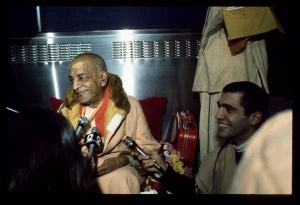BG 4.19 (1972)

A.C. Bhaktivedanta Swami Prabhupada
TEXT 19
- यस्य सर्वे समारम्भाः कामसङ्कल्पवर्जिताः ।
- ज्ञानाग्निदग्धकर्माणं तमाहुः पण्डितं बुधाः ॥१९॥
- yasya sarve samārambhāḥ
- kāma-saṅkalpa-varjitāḥ
- jñānāgni-dagdha-karmāṇaṁ
- tam āhuḥ paṇḍitaṁ budhāḥ
SYNONYMS
yasya—one whose; sarve—all sorts of; samārambhāḥ—in all attempts; kāma—desire for sense gratification; saṅkalpa—determination; varjitāḥ—are devoid of; jñāna—of perfect knowledge; āgni—fire; dagdha—being burnt by; karmāṇam—the performer; tam—him; āhuḥ—declare; paṇḍitam—learned; budhāḥ—those who know.
TRANSLATION
One is understood to be in full knowledge whose every act is devoid of desire for sense gratification. He is said by sages to be a worker whose fruitive action is burned up by the fire of perfect knowledge.
PURPORT
Only a person in full knowledge can understand the activities of a person in Kṛṣṇa consciousness. Because the person in Kṛṣṇa consciousness is devoid of all kinds of sense-gratificatory propensities, it is to be understood that he has burned up the reactions of his work by perfect knowledge of his constitutional position as the eternal servitor of the Supreme Personality of Godhead. He is actually learned who has attained to such perfection of knowledge. Development of this knowledge of the eternal servitorship of the Lord is compared to fire. Such a fire, once kindled, can burn up all kinds of reactions to work.